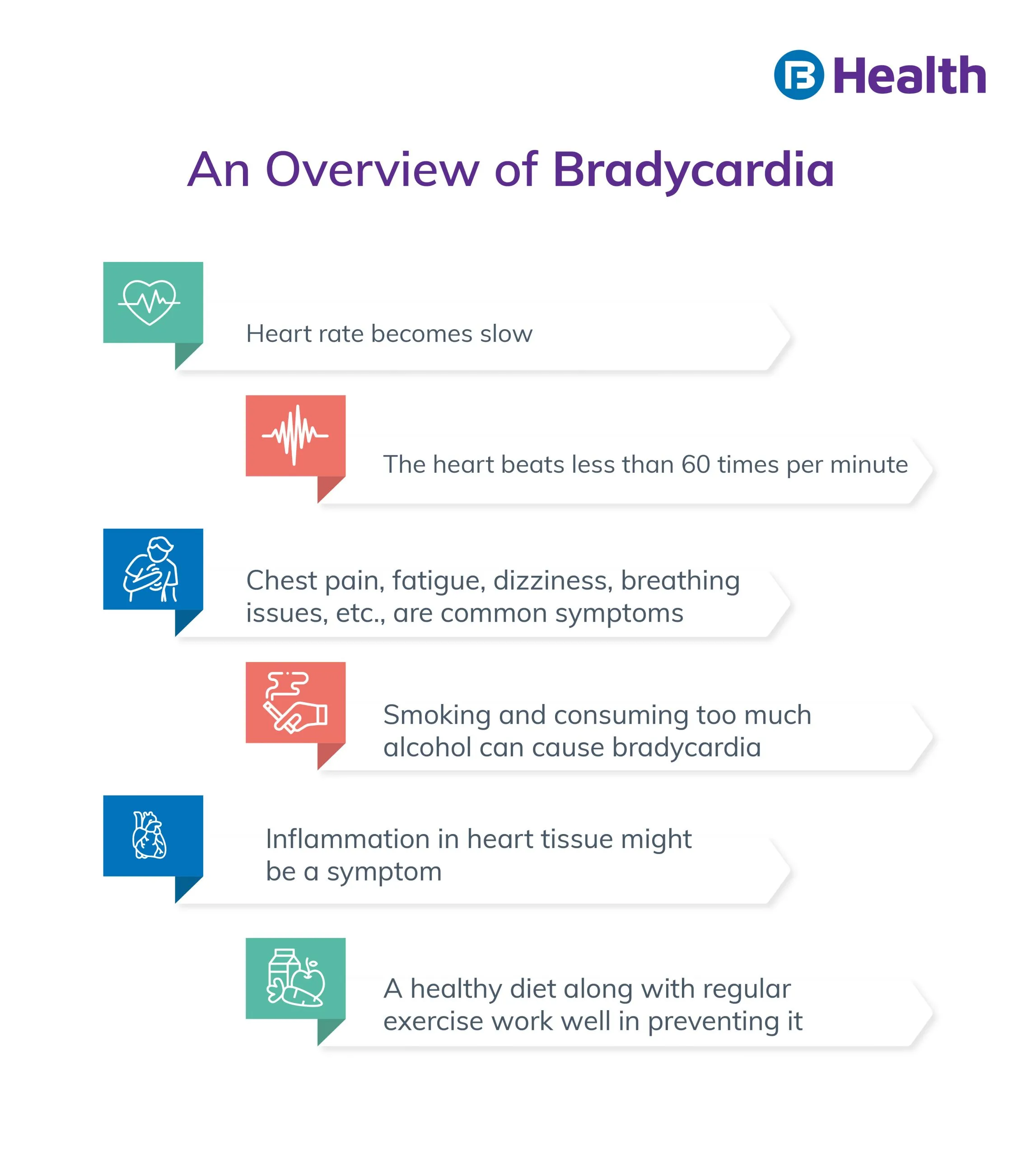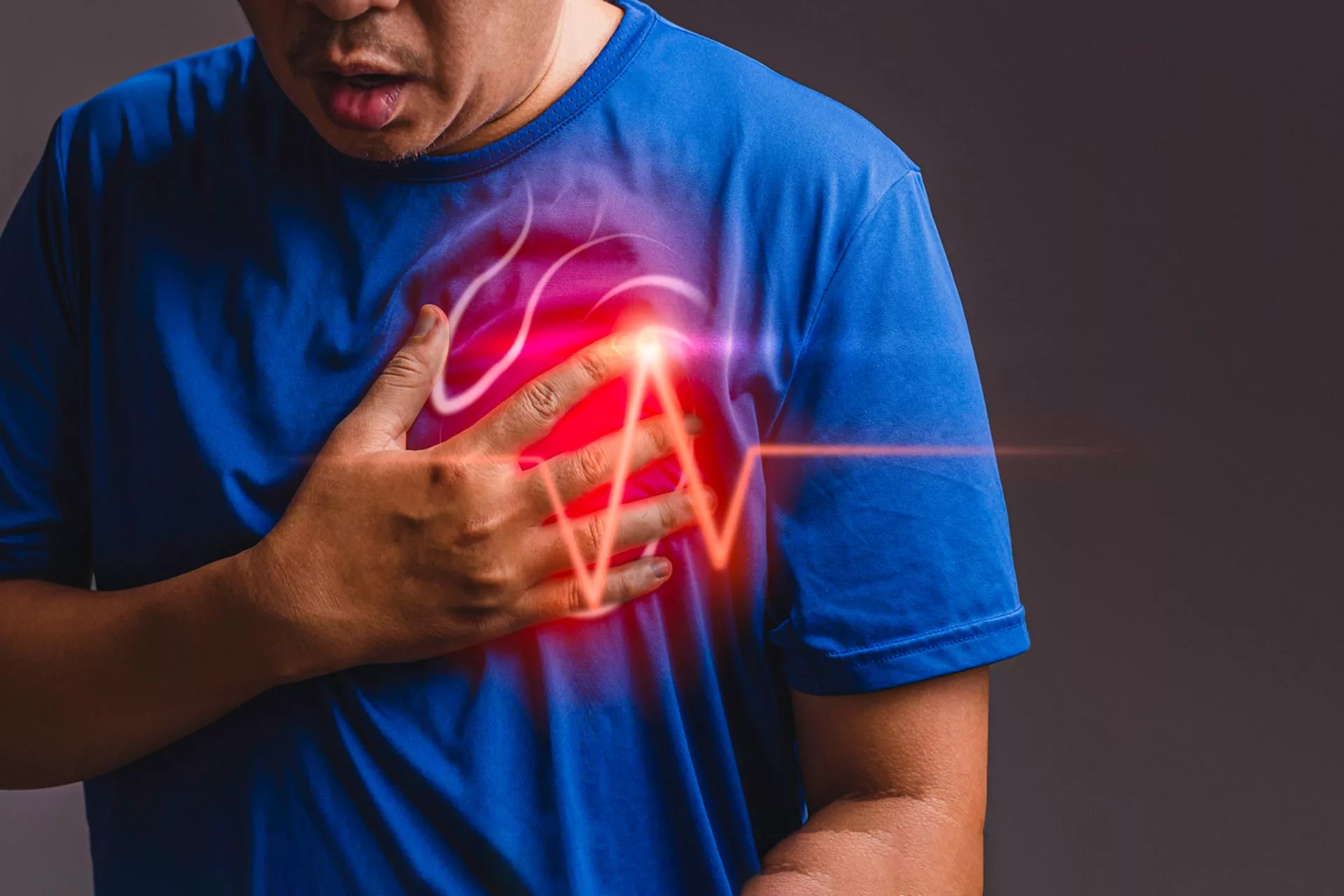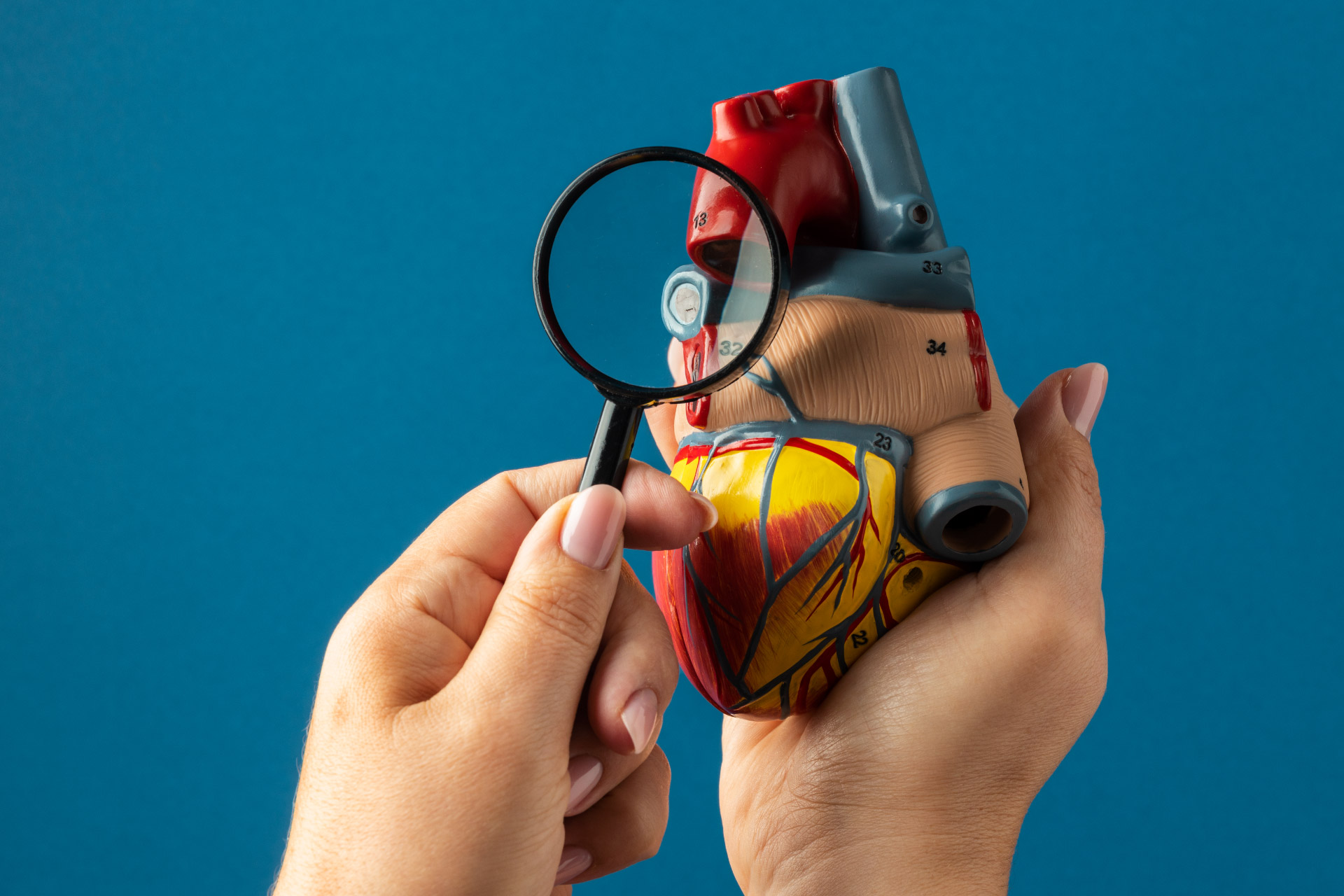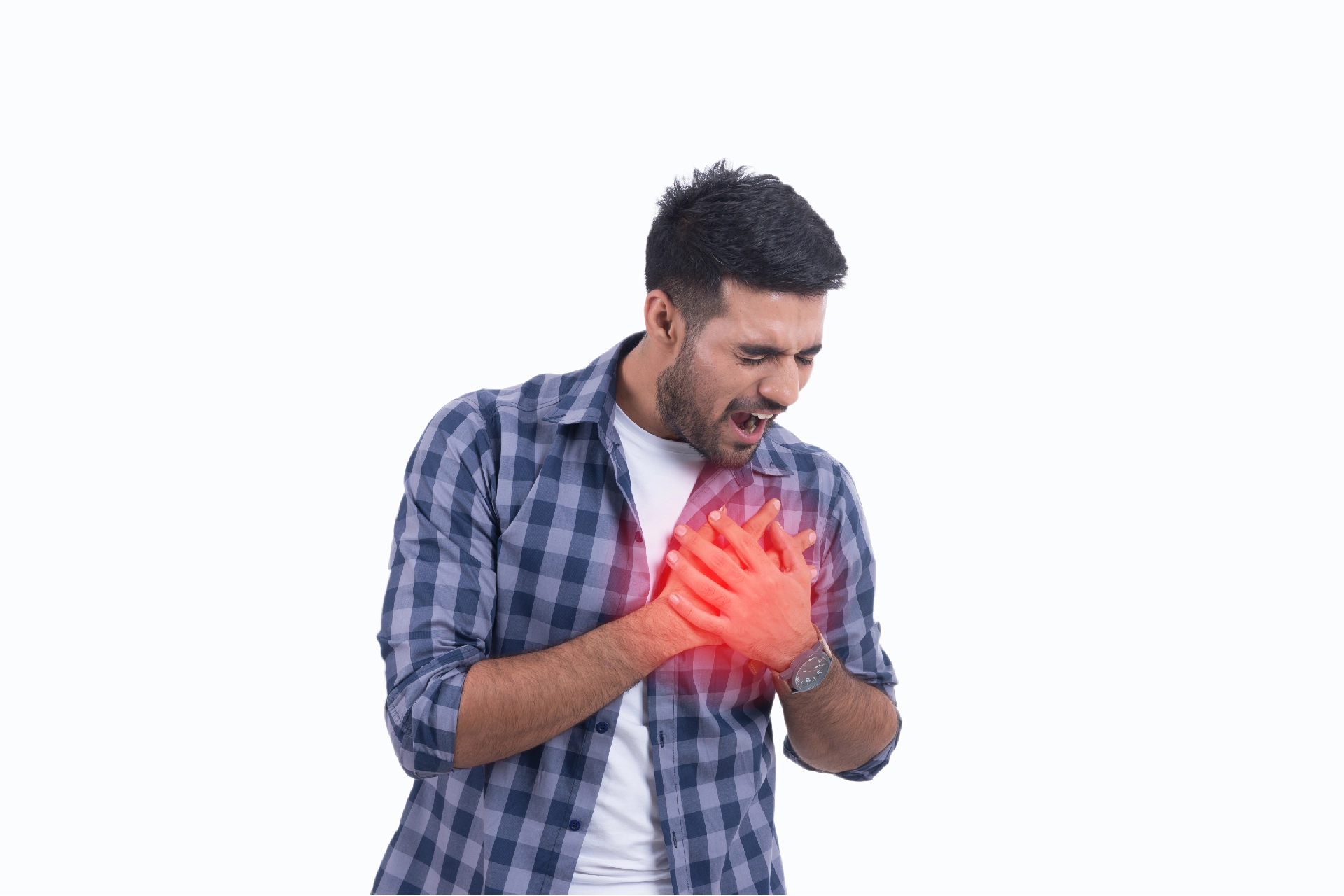Heart Health | 7 min read
Bradycardia: Symptoms, Causes, Prevention, Diagnosis
Medically reviewed by
Table of Content
Synopsis
Do you know a normal heartbeat with a speed between 60 and 100 bpm while resting? Whereas patients suffering from bradycardia will have a heart rate slower than usual, this medical condition is effectively treatable, whereas diagnosing and treating at the right time is essential.
Key Takeaways
- Some healthy individuals like Athletes have lower than normal heart rates
- It is normal to drop your heartbeat while sleeping
- The progress in the medical industry raised the scope of bradycardia treatment
Heart rate signifies how healthy your heart is. It is measured by the number of times your heartbeat is in one minute. As already said, having 60-100 bpm while resting comes under the healthy heart range. However, trained athletes may have a lower heart range because of a strong heart; extra hard work is not needed to pump blood throughout the body. In certain cases, bradycardia may turn out to be serious if the heart rate becomes too slow to pump enough oxygen-rich blood to meet the body’s needs. There are also chances that this medical -condition occurs and shows no harmful effects if the person is physically fit & active. The term bradycardia comes from the Greek words Bradys and Kardia, which together mean slow heart.
There are several causes of bradycardia, and in some cases, symptoms are not visible. However, it is also good to be aware of the situation. Read further about bradycardia symptoms, bradycardia treatment, and causes.
Symptoms of Bradycardia
A slower heart rate means enough oxygen-rich blood is not reaching the orangs & tissues of the body. This can affect the heart and brain systems. Due to this, the body may find it hard to process normal functions. In some cases, symptoms may be mild or not much noticeable. The common bradycardia symptoms include:
- Chest pain
- Weakness
- Shortness of Breath
- Fatigue
- Memory-related problems, confusion
- Lack of concentration
- Fainting, dizziness, Lightheadedness
- Getting easily tired during physical activity
- Heart Palpitations
- Irritability
- Agitation
If you notice any of the symptoms happening frequently, it’s good to take the doctor’s advice.

Causes of Bradycardia
The treatment of bradycardia tends to be easier after realizing the causes of bradycardia. Here are a few reasons for this medical state:
Deficiency in Electrolytes
Electrolytes such as potassium, calcium & magnesium influence cardiovascular functions. The imbalance of these electrolytes can affect the heart rate.
Bacteria
Bacteria from certain infections can cause heart damage, especially to heart valves.
Myocarditis
Inflammation of the heart muscle occurs due to infection or autoimmune disorder. This condition reduces the heart’s ability to pump blood.
Anorexia Nervosa
An eating disorder where the patient suffers from an intense fear of gaining weight leads to abnormally low body weight. This health condition is associated with bradycardia.
Congenital Heart Disorder
The abnormalities in the working condition of the heart by birth. While repairing congenital heart disorders or valve replacement, there is a risk of causing bradycardia.
Hypothyroidism
Thyroid hormones help to control heart rate. The underactive thyroid gland produces fewer hormones which affect the heart rate.
Sleep Apnea
Interrupted sleep pattern has the potential to contribute to this condition.
Rheumatic Fever
Rheumatic fever caused due to bacterial infection can lead to bradycardia after the first attack.
Block in Heart
Interruption in the flow of the heart’s electric current; the electrical signals follow the irregular pattern of flow from the upper chamber to the lower chamber. The complications of heart block are divided into three degrees.
Inflammation
Inflammation occurs to the heart’s inner lining, endocarditis, heart muscle, or pericardial sac and may promote bradycardia.

Side Effects From Certain Medicines
- Beta-blockers- Prescribed to control blood pressure
- Calcium channel blockers
- Narcotic medications
- Antiarrhythmic drugs
- Recreational drugs (marijuana)
Sick Sinus Node Syndrome
Before understanding the sinus node, let us get an idea of the heart structure. A heart has four chambers, two upper chambers called atria and lower chambers called ventricles. In the upper right chamber of the heart, there is a group of cells referred to as the sinus node. It is called a natural pacemaker of the heart. It initializes the signals that produce a heartbeat.
Sick sinus node syndrome affects the sinus node and disrupts heart rhythm. People suffering from sick sinus may experience slow heartbeat and alternation of heart rhythm, hence becoming one of the causes of bradycardia.
How To Diagnose Bradycardia?
Health care providers undergo physical examination & laboratory tests to confirm bradycardia. The tests include:
- Electrolyte test to measure potassium, calcium, magnesium
- Other laboratory tests include a test to check thyroid hormone levels & troponin.
- Toxicology screening to identify drugs
- Sleep study to understand sleep pattern
- An echocardiogram diagnoses a heart condition and uses sound waves to create images of the heart.
- Health care providers also conduct a physical examination to measure vital signs, including heart rate, blood pressure & respiratory rate.
- Electrocardiogram (ECG or EKG) – It is an important test to detect bradycardia because it gives a precise report of the heart’s electrical activity.
Medical Treatment For Bradycardia
In the early stages of bradycardia, the doctor may not suggest treatment depending on the cause. If the slow heart rate is a side effect of a drug doctor may replace the medicines.
Medicines
These are the few medicines used to treat bradycardia only in difficult situations where symptoms are acute. This medicine helps to increase heart rate.
- atropine
- dopamine
- epinephrine
- glycopyrrolate
This medication is injected via intravenous infusion.
Temporary Cardiac Pacing
It is an effective short-term treatment for those who need a pacemaker or whose bradycardia will likely be short-lived. In this treatment, a device with electrical contact is used to provide a mild electrical current to stimulate the heartbeat.
Permanent Pacemaker
For some people, a permanent pacemaker is the best solution, especially if the patients are suffering from sick sinus node syndrome, where your heart’s natural pacemaker cells are unable to initiate electric signals properly. In this bradycardia treatment, a device is implanted via surgery to maintain the heart rhythm. Most pacemakers last for years, and if it relies on the battery, it continues for decades.
Additional read: Improve Heart HealthHow to Prevent Bradycardia?
Even though it is not preventable, here are a few natural ways promoted by a health care provider to reduce the chances of bradycardia.
Healthy Diet
A healthy life starts from a healthy diet. Try to include a Heart Healthy Diet in your diet chart. Food with low fats, low sugar, vegetables, whole grains, and dairy products are good for the heart. Apples, Avocados, and Berries are favorable fruits for the heart.
Exercising
Physical activity is essential for body fitness. You can include a 10-minute walk and morning jogging in your daily schedule. If you are a gym person, seek expert advice on a heavy workout.
Alcohol
Avoid too much drinking. It’s okay to have drinks in one or two months but if you think it’s going above the top, press the pause button immediately. If you cannot control the habit, take a doctor’s help.
Body weight
Increasing body weight enhances the risk of heart disease, but it doesn’t mean starving to reduce weight. Try to have a healthy diet in the required quantity with other routines like exercise, yoga, or gym.
Stress
Emotional imbalance can affect the heart at an immense level. Manage your stress with the help of relieving techniques like meditation, happy clubs, and support groups.
Check-up
Treatment at early stages increases the chances of a cure. If possible, try to have a periodical check-up to know your blood glucose level, bp & tests for Healthy Heart.
Use of Recreational Drugs
These drugs are not consumed for medical reasons. Avoid the usage of this kind of drug, and remember self-medication is harmful; if you notice any kind of uneasiness after having this substance, meet the doctor without fail.
Additional read: How does leading a sedentary lifestyle affectHow Long Can Bradycardia Stay?
It can be a life-long problem or live for a short period. In most cases, it stays for a short time due to certain drugs. However, the cause decides the duration of the disease. Other than medicines & treatment, you can put efforts from your end by maintaining a healthy lifestyle, avoiding unnecessary stress & most importantly, accepting the health condition & try to build a positive mindset [1]. Easier said than done, but doctors have suggested a patients-mindset effect for faster recovery and well-being.
You may feel panicky and hesitate to share with others by noticing certain symptoms. What if you can seek professional advice from your place in your comfort?
Bajaj Finserv Health has started an initiative to clear all your doubts with one click. To seek professional guidance, you just have to download the Bajaj Finserv Health application, register your details and fix an appointment with the doctor. With the help of video conferencing, you can have a proper conversation with the doctor. So let us take a small step today to have a healthy heart. Consult Bajaj Finserv Health today!
References
- https://positivepsychology.com/positive-mindset/
Disclaimer
Please note that this article is solely meant for informational purposes and Bajaj Finserv Health Limited (“BFHL”) does not shoulder any responsibility of the views/advice/information expressed/given by the writer/reviewer/originator. This article should not be considered as a substitute for any medical advice, diagnosis or treatment. Always consult with your trusted physician/qualified healthcare professional to evaluate your medical condition. The above article has been reviewed by a qualified doctor and BFHL is not responsible for any damages for any information or services provided by any third party.




